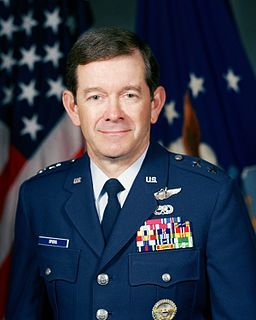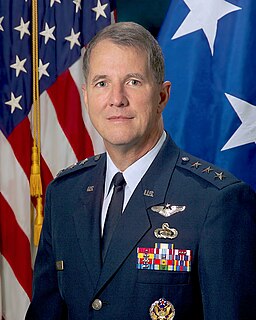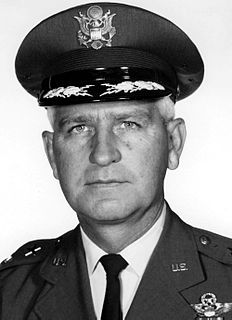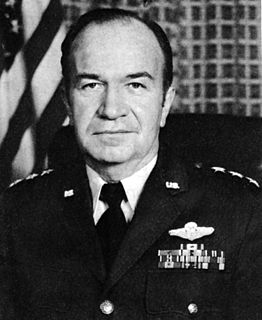Military career
After graduating from the United States Naval Academy, Thurman was commissioned as a second lieutenant and entered active duty in June 1954. [3] He was trained as a pilot at Spence Air Base, Georgia and Laredo Air Force Base, Texas. He also received fighter gunnery training at Laughlin Air Force Base, Texas, and Luke Air Force Base, Arizona. He served as an RF-84 pilot at Kadena Air Base, Okinawa, Japan from August 1956 to May 1958. [3]
He completed 2 months of instructor training at Craig Air Force Base, Alabama in July 1958 and then was assigned to the 3576th Pilot Training Squadron at Vance Air Force Base, Oklahoma. [3] In February 1961 he entered the Air Force Institute of Technology at Wright-Patterson Air Force Base. Upon graduation in October 1962 with a M.S. in Aeronautical Engineering, he was assigned as an aeronautical engineer in the Aerospace Research Laboratories, also at Wright-Patterson. [3] General Thurman graduated from the Army Command and General Staff College in July 1965 and transferred to Ent Air Force Base, Colorado, as a staff officer at Air Defense Command headquarters. [3]
Thurman served in Southeast Asia from November 1966 to October 1967, initially as an F-105 fighter pilot and flight commander with the 469th Tactical Fighter Group at Korat Royal Thai Air Force Base, Thailand. He became an operations staff officer at 7th Air Force headquarters, Tan Son Nhut Air Base, Republic of Vietnam. [3]
After returning to the United States in 1967, Thurman was assigned to Headquarters U.S. Air Force, Washington, D.C., a where he worked until August 1971. His was first assigned as a foreign development officer in the Office of the Deputy Chief of Staff for Research and Development. In October 1969 he was named aerospace assistant to the National Aeronautics and Space Council, Executive Office of the President. [3]
He was assigned to the Aeronautical Systems Division, Wright-Patterson Air Force Base, in August 1971 as assistant director and a charter member of the Prototype Program Office. He was named deputy for prototypes in June 1973, deputy for air combat fighter in May 1974, deputy for F-16 in January 1975 and deputy for engineering in May 1976. [3]
In May 1978 General Thurman was assigned to the Electronic Systems Division at Hanscom Air Force Base, Massachusetts, as deputy for control and communications systems. He then was named commandant of the Defense Systems Management College at Fort Belvoir, Virginia, in November 1979. [3]
After the B-1 program was reinstituted, General Thurman became Aeronautical Systems Division's deputy for the B-1B in November 1981, again at Wright-Patterson Air Force Base. In May 1985 he moved to Andrews Air Force Base, Md., as vice commander of Air Force Systems Command. He assumed his present command in July 1986. [3]
General Thurman is a command pilot with more than 3,800 flying hours and 56 combat missions. His military decorations and awards include the Air Force Distinguished Service Medal, Defense Superior Service Medal, Legion of Merit with two oak leaf clusters, Distinguished Flying Cross with oak leaf cluster, Bronze Star Medal, Purple Heart, Air Medal with four oak leaf clusters and Air Force Outstanding Unit Award with oak leaf cluster. He received the Air Force Association's Meritorious Award for Program Management in 1976 and Distinguished Award for Management in 1985. [3]
He was promoted to Lieutenant General June 1, 1985, with same date of rank. He retired August 1, 1988. [3]



















